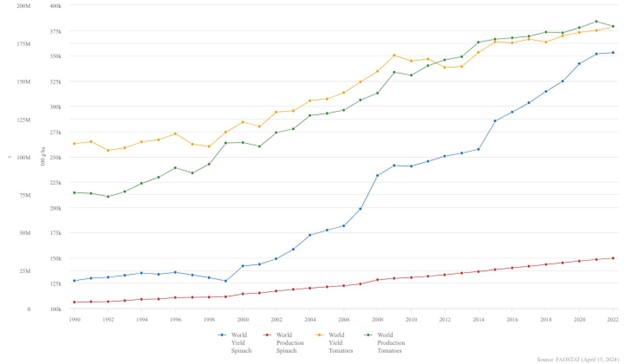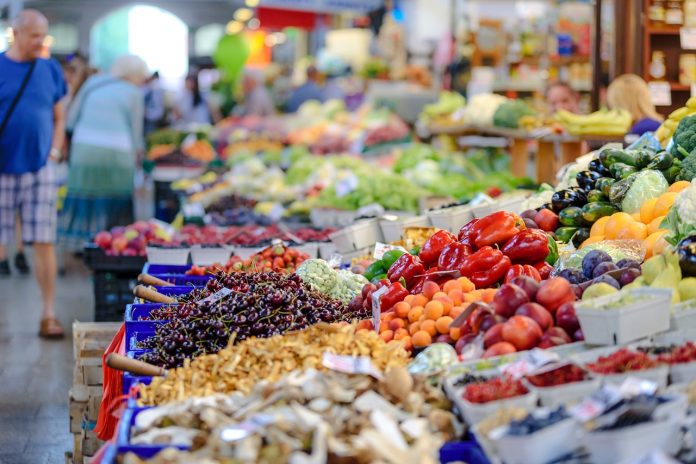The German edition of the April 12 Epoch Times ran a story, titled “Food prices remain high – companies blame climate change.” The Epoch Times, an international newspaper which publishes in 33 countries and 21 languages, rightly expressed skepticism of this claim. Climate change can’t cause inflation, which is always and only a result of government monetary and fiscal policy, and data is clear that modest warming and higher carbon dioxide levels are boosting food production.
After noting that the recent decline in inflation has still left food prices at “crisis levels,” the Epoch Times points to two recent reports blaming climate change for continued food price inflation.
“In a detailed article, the “Handelsblatt” refers to a variety of negative effects that phenomena such as heat, drought, extreme rainfall, increased pest infestation or plant diseases had on crops,” writes the Epoch Times. “A study by the ECB and the Potsdam Institute for Climate Impact Research also assumes possible food inflation of up to 3.2 percent in Europe by 2035 – due to climate change.”
The claim that climate change is causing food inflation is easily disposed of. As discussed at Climate Realism across hundreds of articles, none of the climate related weather phenomena mentioned in the story as causing food production problems is worsening; not drought, not extreme heat, not heavy rainfall, not crop pests.
And, indeed, regardless of the weather, Climate Realism has published more than 200 articles showing that crop production and yields have increased dramatically as the Earth has modestly warmed. The articles examine trends for dozens of crops from countries all across the globe covering almost every type of regional climate where crops are produced.
Those interviewed by the Epoch Times complained in particular about the decline in specific crops in specific countries during particular years. Everyone knows weather impacts crops seasonally, yearly, and sometimes over multiple years, so a single year or couple of years’ production of a specific crop in one country or another says nothing about whether long-term climate change is causing a problem. To make such a connection one must look at long-term trends.
Climate realism has previously refuted claims that climate change caused a decline in cocoa beans, coffee beans, grapes, olives (see, for example, the Figure 1, below), sugar. Those posts cite data from the U.N. Food and Agriculture Organization to show that both production and yields for these crops have increased dramatically as the Earth has warmed slightly over the past 30 and 50 years, regularly setting records.

What’s true of those crops is true of spinach and tomatoes, also mentioned in the Epoch Times article, as well. Both crops have experienced a substantial increase in production and yield amidst recent climate change. (See Figure 2 from the FAO below)

The same is also true of sour cherries, which experienced a more than 83 percent increase in production since 1990, on an increase in yield in excess of 60 percent. Blaming the sustained increase in prices for orange juice, chocolate, or organic grapes on a decline in production from one specific country in a single year is the cherry picking of the data by orange juice producers, vintners, and chocolatiers to divert blame from themselves, and the governments which regulate and control their fates, onto the boogeyman of climate change.
In fact, sustained high food prices are not the result of a changing climate but of changing government policies, policies which increase demand in times of limited supply and policies instituted to fight climate change. As Climate Change Weekly discussed recently government climate policies, both domestic and international, have increased the costs of all of the inputs into food, from seeds, to fuel, to pesticides and fertilizers, to electricity for non-perishable storage. These policies have lingered long after the COVID 19 lockdowns, even as governments have expanded the money supply and increased the debt through deficit spending.
Food demand is fairly inelastic. People have to eat to survive, no matter the costs. Demand for food hasn’t increased dramatically. But government policies have made food production harder while disincentivizing financing and investments in food production through public spending. These two factors have resulted in sustained higher food prices
The Epoch Times rightly acknowledges the problematic nature of the claim that climate change is causing food inflation, quoting the Climate Change Weekly article on the topic. Climate change doesn’t print money, nor does it create new programs or increase government spending, injecting money into the economy when productivity is not increasing.
Government policies created inflation in general, and food inflation in particular. And government can end both by halting unjustified, rapidly increasing spending, especially spending on climate policies and by reversing regulations and executive actions which make it more expensive and harder to produce affordable food.



















